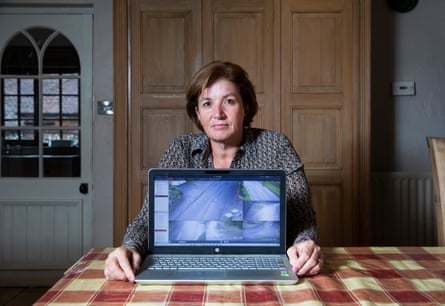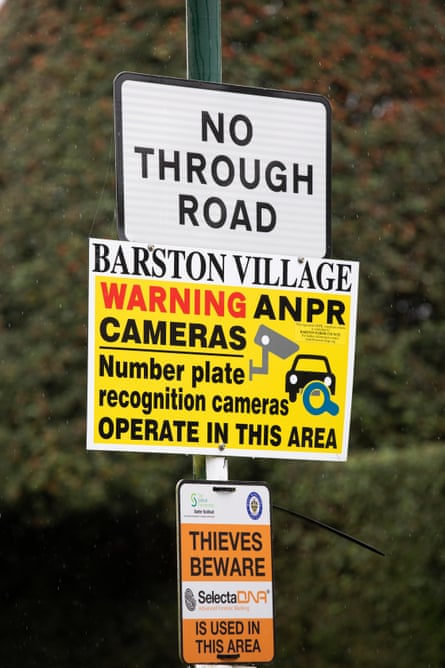The TV comes over the garden wall first, in a graceful arc, rolling twice before coming to a stop, the screen miraculously unsmashed. Next come a tyre, a door frame, a drawer, miscellaneous pieces of wood and bits of hoarding.
A young woman appears, voice raised in anger. “What are you doing?” she asks, filming events on a mobile phone. “I’m the owner of the land,” responds Clifford Hamilton, who is flinging rubbish into her garden with the aid of two workmen. She steps away and calls the police as more rubbish – a door, planks of wood, what looks to be part of a kitchen cabinet – sails over the wall.
“You are an irresponsible next-door neighbour who’s getting it all back!” Hamilton bellows, as a man on the other side of the wall proclaims his innocence. The men then jab their fingers at each other angrily. Two police officers arrive. “Everyone calm down and stop throwing things,” an officer pleads. There is more yelling – there is a lot of yelling. The officer handcuffs Hamilton’s neighbour as he passionately pleads his case. It is an undignified spectacle, if an amusing one. There is something about fly-tipping that brings out the worst in all of us.
“I’ll tell you how it all started,” says Hamilton, when I call him a few weeks after the incident, which was filmed and shared widely online. Hamilton, 57, a businessman from Shepperton in Surrey, is the owner of the land in Hounslow, west London, at the centre of this dispute. He bought the land earlier this year with the intention of redeveloping the site into a care home. Then he discovered that almost 70 cubic metres of rubbish had been fly-tipped at the end of the plot. Hamilton believes it was tipped over the wall and blames the owner of the neighbouring property, Gurvinder Singh Luthra.
Hamilton says he spoke to other neighbours, who told him they had seen Luthra’s workers dumping rubbish on his land. He says he asked the former owner whether he had given Luthra permission to dispose of waste on his property; the owner said no. After trying and failing to get hold of Hounslow council’s environmental health team, this August Hamilton opted for the nuclear option. “I did it to highlight what on earth is going on with fly-tipping in this country at the moment.”

Luthra’s position is radically different. He told the Guardian he is taking legal action and did not want to comment until the courts made their findings known. “I don’t know where the rubbish came from,” the 68-year-old told the Daily Mail in August. “It doesn’t belong to us.” He said that the site, which has been unoccupied since a gas explosion in 2013, had become a known spot for fly-tipping. “Last month, someone turned up in a white van, broke the locks to the front gate and dumped a load of rubbish,” Luthra said. “We called the police and reported it … All we’ve tried to do is stop the land from being littered.”
One thing is clear: fly-tipping is a national scourge. Even before Covid-19, it was a major problem for UK councils. Large-scale fly-tipping – defined as the dumping of a lorryload of rubbish – more than doubled in England between 2012 and 2019. English councils spent GBP12.8m last year clearing up more than 36,200 large tips. It is believed that organised crime may be behind the surge, with criminals posing as legitimate waste-disposal businesses only to dump the rubbish they collect on private land or public roads.
But Covid-19 turbocharged the problem. Fly-tipping increased by 300% at the start of lockdown, according to the Daily Mail. “It was a perfect storm of people being furloughed, finally getting around to doing DIY jobs they’d been putting off and then finding that recycling centres were closed,” says Richard McIlwain of Keep Britain Tidy. Household goods stores saw a 42% rise in sales in May, while about half of local authorities closed their recycling centres or reduced opening hours, meaning there was nowhere for the public to take their DIY offcuts and empty tins of paint.
Horrifying stories began to emerge. In May, a fire chief described a pile of rubbish dumped in Barrow Island, Cumbria, as the worst case he had ever seen – crews had to douse the material in water as a precaution against fire. In August, two tonnes of rotting raw meat were fly-tipped on a farmer’s land in North Lanarkshire. The same month, 24 birds died following a fire at Rooster Farm and Rescue Doncaster, after a fire set by a fly-tipper got out of control. “I was in tears,” says Jodie Swan, the manager. “My partner tried to get in there to rescue the birds, but the fire brigade said it was too dangerous … we try so hard to rescue animals and you feel like you’ve let them down.”
Some communities are fighting back. “Let’s start a war on fly-tippers,” reads a post in a Facebook group in which residents attempt to catch fly-tippers. Similar groups have sprung up across the country. In August, a video went viral of Stuart Baldwin, a farmer from Wigan, supposedly returning 400 tyres that had been dumped on his land to the terraced house of the person he believed was the culprit. (“Fantastic,” Baldwin can be heard chuckling to himself, as the lorry containing the tyres backs up towards the house.)
“I didn’t really think about it, to be honest,” says Andrea Good, 42, a groom, of her experience confronting fly-tippers on her farm in June. “I just knew the rubbish wasn’t going to stay there.” Like many fly-tippers when they are confronted, the men claimed they had taken the material off their van to sort it. “They were lying through their teeth,” says Good. “They’d thrown bits over the fence!” They cleared the material up, apologising as they did so, while Good stood and watched. Afterwards, she uploaded a video of the encounter to Facebook. “I only posted it for my farming friends to chuckle at,” she says. It went viral: she has had 12,000 Facebook messages of support – and three marriage proposals. “My kids think it’s brilliant,” says Good. “They spend their whole lives trying to go viral and their mum does it without even trying.”
Some go one step further and hunt down fly-tippers, vigilante-style, to stop them in their tracks. “There was one guy who pulled a crowbar on me,” says Zaheer Akbar of a recent incident in which he stopped a fly-tipper on Arley Road in Birmingham. “He was going mad! But I said: ‘Pick your crap up and leave.'” Akbar, a 38-year-old NHS call handler, is a member of the Alum Rock Community Forum, a group of residents in the Birmingham district set up in 2016 to tackle fly-tipping. Normally, the group reports about 2,000 fly-tipping incidents a year to the council, but since the start of the year Akbar alone has filed 800 reports. He frequently confronts fly-tippers mid-act and makes them load their stuff back on to their van, although – as the crowbar incident shows – things can turn heated. “I’m used to it,” Akbar says. “I’m not frightened.”

Sometimes the best way to deal with fly-tippers is a stake-out. “I do, on occasion, wonder how I get into these situations,” sighs Martin Montague of his recent experience of being chased by dogs, after a fly-tipping gang caught him filming them through night-vision goggles while lying in a field in the dead of night. It started when Montague got wind of the gang, which had dumped a tipper-truck’s worth of rubbish on a country lane in Hampshire last November. The 47-year-old businessman, from Winchester, is the founder of the anti-fly-tipping app ClearWaste, which enables users to get waste-removal quotes from legitimate operators and report fly-tipping. Using social media, Montague tracked down the gang and pressed them into picking up their waste. But he could not resist videoing them in the act – which is how he found himself being chased through farmland at night, after the gang saw the red light on his goggles. “I’m not going to lie,” he says. “I thought I was going to die.”
It was not Montague’s first run-in with the fly-tipping criminal underworld. In August, he received a tip-off: fly-tippers had been hitting a trampoline park in north London. “The operators said they’d contacted the police, but no one was interested,” Montague recalls. “I thought, I’ll get them. Night vision, bush.” He staked out the trampoline park, but the fly-tipper saw him – perhaps Montague needs to improve his subterfuge – and chased him across London in a van with no licence plates or lights on. I ask Montague an obvious question – why is he doing this? “I don’t earn a penny from the app,” Montague says. “It’s my quest to try to put something back. My wife and I can’t have kids, so this is my legacy. People are at their wit’s end with fly-tipping.”
Barston, near Solihull in the West Midlands, may just be the worst village in the UK in which to fly-tip – or have an affair, for that matter. “There’s no way my husband could cheat on me!” laughs Caroline Hadley, a 52-year-old homemaker from Barston. “I’d know straight away.” Hadley is the village’s unofficial CCTV operator: there are eight high-definition cameras positioned around the village to deter fly-tippers, all monitored by Hadley. Barston has long been a mecca for fly-tippers. “We’ve had asbestos dumped, empty pots from cannabis farms, builder’s rubbish and children’s toys,” says Hadley. “It’s because we have lots of exit roads leading to different areas. It’s so wrong. There’s a tip just down the road. Why can’t people take their rubbish there?”
In 2018, Barston’s parish council decided: enough. They clubbed together to buy the cameras and set up a WhatsApp group. Hadley volunteered herself as chief CCTV operator – she monitors the cameras at her makeshift control suite (her kitchen table). Now, when a Barston villager sees something dodgy, like a tipper-truck reversing slowly down a dead-end road, or they find rubbish dumped in a field, they message the group and Hadley checks the CCTV. “It sounds like we’re stalking people,” she groans. “We really aren’t. Please don’t make me out to be a stalker.”

Hadley has tracked down multiple fly-tippers through her amateur sleuthing, including one local authority employee who was dumping rubbish illegally. But sometimes the Barston villagers can be too wary. “There was a vehicle going really slowly recently and lots of people went out on to the road to confront the driver,” says Hadley. “It turned out to be a bloke dropping off a takeaway.”
Since Barston’s success, four parish councils have asked how to do something similar. Of course, communities should not have to do this – fly-tipping is a criminal offence. (Offenders can be fined up to GBP400 on the spot; a crown court can hand down an unlimited fine and up to five year’s imprisonment.) But some councils don’t enforce the law: according to ClearWaste’s data, 20% of councils did not issue fixed penalties or prosecute fly-tippers last year. “Council environmental health officers are as effective as a chocolate teapot,” says Hamilton. “Fly-tippers are always stupid. They usually leave an address in there. But councils don’t do anything about it.” Things are especially dire for farmers, who are responsible for clearing material dumped on private land. (Councils will remove material for free only if it was tipped on public land.)
In the absence of council enforcement, some fly-tipping victims are turning litigant: in February, the first private prosecution against a fly-tipper ended in success, after members of the Coity Wallia Commoners’ Association brought an action against the people who had dumped waste on land in Bridgend. (They identified the fly-tippers using documents left in the rubbish.)
“We saw it as an innovative way of dealing with the fly-tipping,” says Bryn Thomas of the environmental law firm HCR Law, which worked on the case. After the private prosecution was filed at Cardiff magistrates court in December, the judge prepared to issue a court summons – at which point the fly-tipper paid to clean up the waste. “We wanted to send a message that private prosecutions are a robust way of dealing with fly-tipping that doesn’t depend on councils or police taking action,” says Thomas. “Individuals have a mechanism to bring people to account.”
A better solution, of course, would be to nip fly-tipping in the bud. “We need to make it easy for people to do the right thing,” says McIlwain, explaining that some recycling centres will make residents pay to dump materials that are not household waste. “We appreciate that local authorities need to raise money, but they should be properly funded by central government,” he says. “If the system is fully funded, so that recycling centres open seven days a week and accept a variety of materials, you won’t have so many people going on Facebook and hiring dodgy people cheaply.” He also calls for strengthening the waste-carrier licensing process, plus tougher court penalties. “Ninety per cent of fines are less than GBP1,000 – a day’s pay if you’re running a professional fly-tipping business.”
As for the Hamilton-Luthra affair, Hamilton’s fly-tipping “justice” may yet cost him dearly. “I have so many great bits of evidence,” Hamilton says. For now, though, the rubbish remains in his garden. “It came back over the wall the following week,” he says. And despite being thrown over a wall twice, the TV appears intact. “It’s very strong,” Hamilton says. “I should plug it in and see if it works.”